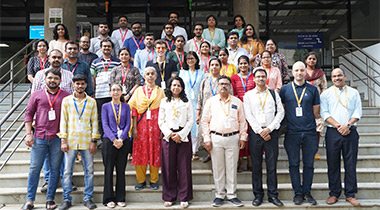
Events

Presentations
- Journey of Malaria Modelling: Tracing the Footsteps of Ronald Ross
- Insights from a decade long , hospital-based malaria study in Goa
- Malaria: epidemiology, current scenario and public health tools for disease control
- Introduction to OpenMalaria
- Malaria vectors and pattern of malaria transmission in East Central India: from control to elimination
- Simulating the Lake Kariba mass drug administration trial to understand what it takes to eliminate malaria
- Data Driven Infectious Disease Modelling for Public Health
- Malaria Elimination in Odisha: Challenges and Research Priorities
- Parasitological, Entomological and Epidemiological studies in a high malaria-endemic area of Tripura
- Modelling and Forecasting Malaria Incidence using Generalized Time Series Models
Workshop on Malaria Modelling, organised by the Malaria Working Group of NDMC, IIT Bombay
Nov 28-29, 2023
The two-day workshop on Infectious Disease Modelling - Malaria, brought together a diverse array of professionals and participants working in the field of malaria. The workshop commenced with a series of thought-provoking talks by renowned experts followed by an interactive hands-on session. Participants were provided an overview of malaria: its history, epidemiology, control and current status.
Day 1 started with a brief introduction by Prof. Harish Phuleria, Associate Professor in the Department of Environmental Science and Engineering and Principal Investigator of the NDMC Malaria Working Group. This was followed by an online presentation by Dr. Jennifer Gardy from the Institute for Disease Modeling, on Malaria: Information, innovation, and intersection. Next, Dr. Sandip Mandal from John Snow India Private Limited, gave a presentation on the Journey of malaria modelling: tracing the footsteps of Ronald Ross. Following this was a series of talks by Dr. Roop Kumari from the World Health Organization, on Malaria elimination in India: Progress, challenges, strategy and new initiatives; Dr. Rimi Chakrabarti from International Center of Excellence for Malaria Research, on Insights from a decade long, hospital-based malaria study in Goa and Dr. Tanzin Dikid from the National Centre for Disease Control, on Malaria: epidemiology, current scenario and public health tools for disease control. The day concluded with an Introduction to OpenMalaria which is an individual-based simulation model, followed by a hands-on session by Lars Kamber and Dr. Thiery Masserey from the Swiss Tropical and Public Health Institute.
During the hands-on sessions, participants were shown how to install and run OpenMalaria. Key concepts such as the Ross model, the feeding cycle of mosquitos, EIR, etc were introduced. Participants were provided scripts (in Python and/or R) to run small simulation experiments with OpenMalaria and plot results. Calculation of the probability of clinical events (uncomplicated, severe malaria, and death) from the parasite density, pyrogenic threshold, etc. as well as ways to parametrize the effect of antimalarial drugs in the transmission model were discussed. The sessions helped to compare the impact of various malaria control strategies in reducing clinical malaria incidence.
The following day also featured a series of insightful talks. These included, Malaria vectors and patterns of malaria transmission in East Central India - from control to elimination by Dr. P. Jambulingam, Former Director of ICMR- Vector Control Research Centre; Simulating the Lake Kariba mass drug administration trial to understand what it takes to eliminate malaria by Dr. Caitlin Bever from the Bill & Melinda Gates Foundation; Efforts to control malaria in Mumbai by Dr. Daksha Shah from the Brihanmumbai Municipal Corporation; Data driven infectious disease modelling for public health: using empirical data in malaria models by Dr. Surabhi Pandey from the Public Health Foundation of India; Prevalence of asymptomatic malaria in Maharashtra by Dr. Mehrunnisa Raje from the ICMR-National Institute of Virology; Malaria elimination: challenges and research priorities by Dr. Nilam Somalkar from the Odisha Regional Office NCVBDC; Targeted and tailor-made intervention cocktail for accelerated malaria control in Jhum Cultivator Tribes of Dhalai District, Tripura State, India by Dr. Ipsita Pal Bhowmick from the ICMR-NE Regional Medical Research Centre; Modeling and forecasting malaria incidence using generalized time series models by Prof. Siuli Mukhopadhyay from the Department of Mathematics IIT Bombay and Principal Investigator of NDMC; and finally, presentations by Dr Siddhartha Karmakar, Research Scientist, and Avik Kumar Sam, PhD student, from NDMC, IIT Bombay. The talks were followed by a continuation of the hands-on sessions by Lars Kamber and Dr. Thiery Masserey. Prof. Usha Ananthakumar, Professor at the Shailesh J. Mehta School of Management and Co-Principal investigator of the NDMC Malaria Working Group, concluded engaging two-day the workshop with closing remarks.